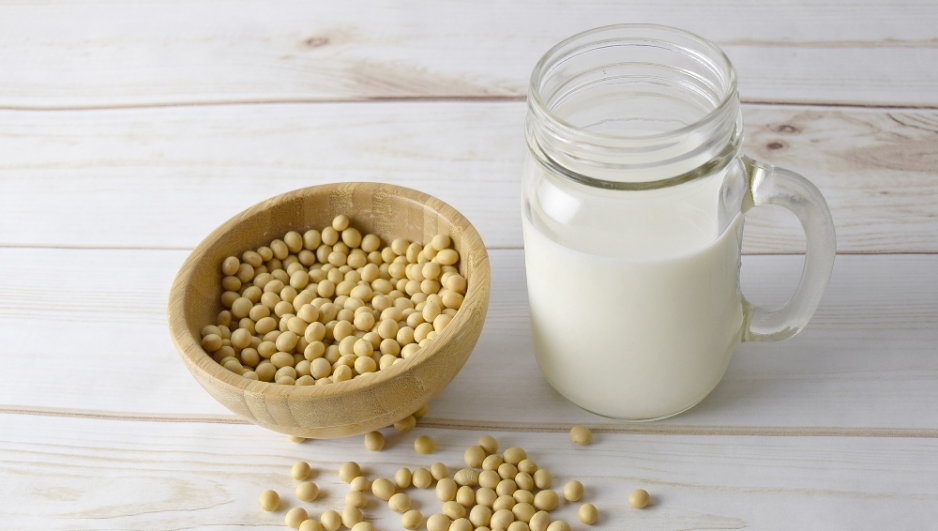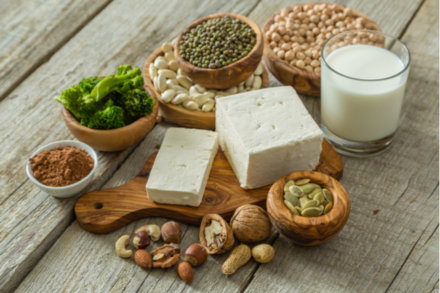
Για κάποιο περίεργο λόγο, ο μέσος κρεατοφάγος πιστεύει ότι οι βίγκαν τρέφονται αποκλειστικά με σόγια. Θα τονίσει μάλιστα ότι πρόκειται και για μεταλλαγμένη.
Το θέμα είναι ότι υπάρχουν αμέτρητες τροφές που μπορεί να φάει ένας βίγκαν και η σόγια είναι μόνο μία από αυτές. Υπάρχουν βίγκαν που δεν τρώνε καθόλου την συγκεκριμένη τροφή.
Σε κάθε περίπτωση, υπάρχουν πλέον πάρα πολλές έρευνες που δείχνουν ότι η σόγια κάνει καλό στην υγεία μας.
Μεταξύ άλλων, τα προϊόντα της σόγιας έχουν αποδειχτεί ευεργετικά στο πλαίσιο της πρόληψης και επιβίωσης από τον καρκίνο του πνεύμονα και τον καρκίνο του στήθους, της πρόληψης του καρκίνου του προστάτη, για την καλή κατάσταση της καρδιάς, την υγεία των οστών, τις φλεγμονές, καθώς και τις εξάψεις κατά την εμμηνόπαυση.

Εδώ και πολλά χρόνια η σόγια έχει αναγνωριστεί, από καταξιωμένους διαιτολόγους και κλινικούς διατροφολόγους, ως εξαίρετη πηγή πρωτεϊνών. Οι καρποί της σόγιας περιέχουν όλα τα βασικά αμινοξέα, καθώς και έναν εντυπωσιακό αριθμό ιχνοστοιχείων (βιταμινών και μετάλλων), όπως το ασβέστιο, ο σίδηρος, το μαγνήσιο, το μαγγάνιο, ο φώσφορος, το κάλιο, οι βιταμίνες Β1, Β2, Β3, Β5, Β6, Β9, C και ο ψευδάργυρος.
Επίσης, σε μικρότερες ποσότητες, περιέχουν φυτικές ίνες, καθώς και λιπαρά ωμέγα-3 και ωμέγα-6.
Τέλος, όπως έχει αποδειχθεί, η κατανάλωση σόγιας στο πλαίσιο μιας δίαιτας που βασίζεται στα φρούτα και στα λαχανικά, σε συνδυασμό με ήπια καθημερινή φυσική άσκηση, συμβάλλει σημαντικά όχι μόνο στην καλή μας υγεία, αλλά και στη μακροζωία μας. Επομένως, αν συμπεριλάβουμε τη σόγια σε ένα ισορροπημένο πρόγραμμα φυτικής διατροφής, όχι μόνο θα ζήσουμε καλά, αλλά και πολύ!
Πηγές:
Isoflavone intake and risk of lung cancer: a prospective cohort study in Japan.
http://www.ncbi.nlm.nih.gov/pubmed/20071645
http://www.ncbi.nlm.nih.gov/pubmed/20071645
Prediagnosis Soy Food Consumption and Lung Cancer Survival in Women.
http://www.ncbi.nlm.nih.gov/pubmed/23530109
http://www.ncbi.nlm.nih.gov/pubmed/23530109
Soy food intake and risk of lung cancer: evidence from the Shanghai Women's Health Study and a meta-analysis.
http://www.ncbi.nlm.nih.gov/pubmed/23097255
http://www.ncbi.nlm.nih.gov/pubmed/23097255
Soy consumption and prostate cancer risk in men: a revisit of a meta-analysis.
http://www.ncbi.nlm.nih.gov/pubmed/19211820
http://www.ncbi.nlm.nih.gov/pubmed/19211820
Dietary patterns and breast cancer risk in Asian American women.
http://www.ncbi.nlm.nih.gov/pubmed/19211822
http://www.ncbi.nlm.nih.gov/pubmed/19211822
Soy protein reduces serum LDL cholesterol and the LDL cholesterol:HDL cholesterol and apolipprotein B:apolipprotein A-1 ratios in adults with type 2 diabetes.
http://jn.nutrition.org/content/139/9/1700
http://jn.nutrition.org/content/139/9/1700
Soy food intake and circulating levels of inflammatory markers in Chinese women.
http://www.ncbi.nlm.nih.gov/pubmed/22889631
http://www.ncbi.nlm.nih.gov/pubmed/22889631
Extracted or synthesized soybean isoflavones reduce menopausal hot flash frequency and severity: systematic review and meta-analysis of randomized controlled trials.
http://www.ncbi.nlm.nih.gov/pubmed/22433977
http://www.ncbi.nlm.nih.gov/pubmed/22433977
Soy protein isolate and protection against cancer
http://www.ncbi.nlm.nih.gov/pubmed/15798082
http://www.ncbi.nlm.nih.gov/pubmed/15798082
Epidemiology of soy exposures and breast cancer risk
http://www.ncbi.nlm.nih.gov/pubmed/18182974
http://www.ncbi.nlm.nih.gov/pubmed/18182974
Childhood soy intake and breast cancer risk in Asian American women.
http://www.ncbi.nlm.nih.gov/pubmed/19318430
http://www.ncbi.nlm.nih.gov/pubmed/19318430
Soyfood intake during adolescence and subsequent risk of breast cancer among Chinese women.
http://www.ncbi.nlm.nih.gov/pubmed/11352858
http://www.ncbi.nlm.nih.gov/pubmed/11352858
Soy food intake after diagnosis of breast cancer and survival: an in-depth analysis of combined evidence from cohort studies of US and Chinese women.
http://www.ncbi.nlm.nih.gov/pubmed/22648714
http://www.ncbi.nlm.nih.gov/pubmed/22648714
Soy for breast cancer survivors: a critical review of the literature.
http://www.ncbi.nlm.nih.gov/pubmed/11694655
http://www.ncbi.nlm.nih.gov/pubmed/11694655
Soy food consumption and breast cancer prognosis.
http://www.ncbi.nlm.nih.gov/pubmed/21357380
http://www.ncbi.nlm.nih.gov/pubmed/21357380
Effect of a phytoestrogen food supplement on reproductive health in normal males.
http://www.ncbi.nlm.nih.gov/pubmed/11352776
http://www.ncbi.nlm.nih.gov/pubmed/11352776
Hormonal effects of soy in premenopausal women and men.
http://www.ncbi.nlm.nih.gov/pubmed/11880595
http://www.ncbi.nlm.nih.gov/pubmed/11880595
Exposure to soy-based formula in infancy and endocrinological and reproductive outcomes in young adulthood.
http://www.ncbi.nlm.nih.gov/pubmed/11497534
http://www.ncbi.nlm.nih.gov/pubmed/11497534
Clinical studies show no effects of soy protein or isoflavones on reproductive hormones in men: results of a meta-analysis.
http://www.ncbi.nlm.nih.gov/pubmed/19524224
http://www.ncbi.nlm.nih.gov/pubmed/19524224
Soy product intake and premenopausal hysterectomy in a follow-up study of Japanese women.
http://www.ncbi.nlm.nih.gov/pubmed/11528492
http://www.ncbi.nlm.nih.gov/pubmed/11528492
Effects of soy protein and soybean isoflavones on thyroid function in healthy adults and hypothyroid patients: a review of the relevant literature.
http://www.ncbi.nlm.nih.gov/pubmed/16571087
http://www.ncbi.nlm.nih.gov/pubmed/16571087
Gender-specific associations between soy and risk of hip fracture in the Singapore Chinese Health Study
http://www.ncbi.nlm.nih.gov/pubmed/19720865
http://www.ncbi.nlm.nih.gov/pubmed/19720865
Relationship of dietary protein and soy isoflavones to serum IGF-1 and IGF binding proteins in the Prostate Cancer
http://www.ncbi.nlm.nih.gov/pubmed/17571965
http://www.ncbi.nlm.nih.gov/pubmed/17571965
Simulation with Soy Replacement Showed That Increased Soy Intake Could Contribute to Improved Nutrient Intake Profiles in the U.S. Population
Soy isoflavones and risk of cancer recurrence in a cohort of breast cancer survivors: the Life After Cancer Epidemiology study
http://www.ncbi.nlm.nih.gov/pubmed/19221874
http://www.ncbi.nlm.nih.gov/pubmed/19221874
Simulation with Soy Replacement Showed That Increased Soy Intake Could Contribute to Improved Nutrient Intake Profiles in the U.S. Population
http://jn.nutrition.org/content/140/12/2296S.full
http://jn.nutrition.org/content/140/12/2296S.full
Effect of Soy Protein Isolate Supplementation on Biochemical Recurrence of Prostate Cancer After Radical Prostatectomy: A Randomized Trial
https://www.ncbi.nlm.nih.gov/pubmed/23839751
https://www.ncbi.nlm.nih.gov/pubmed/23839751
Soybean isoflavone exposure does not have feminizing effects on men: a critical examination of the clinical evidence.
http://www.ncbi.nlm.nih.gov/pubmed/20378106
http://www.ncbi.nlm.nih.gov/pubmed/20378106
Πηγή https://www.greekvegans.gr/health/vlaptei-i-soyia-tin-ugeia/#ixzz5gCKTW4qG